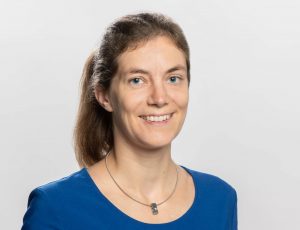
Prof. Barbara Lechner
We cordially congratulate our e-conversion member Prof. Barbara A. J. Lechner on being awarded with the “Dozentenpreis” of the Chemical Industry Fund (Fonds der Chemischen Industrie) on June 16, 2023. With this award, the Fund honors particularly outstanding young scientists. “The phone call from the Chemical Industry Fund really surprised me and I was delighted to be awarded the Dozentenpreis,” says Lechner. “Not only do I receive such a distinguished award and thus also valuable funds for my research group, but I also particularly appreciate that someone nominated me for this award. I personally see this as a great gift.”
Prof. Lechner was appointed Rudolf Mößbauer Professor at TUM in October 2020. The focus of her research group is the microscopic and spectroscopic investigation of the dynamic restructuring of functional nanomaterials under realistic conditions. For example, Prof. Lechner’s group studies catalyst surfaces in reactive gas mixtures using high-resolution scanning tunneling microscopy to follow the stability, reactivity and dynamics of minute active metal particles and the underlying oxide support materials on an atomic scale and in real time.
Prof. Lechner studied chemistry at the University of Innsbruck in Austria. She received her PhD in physics from the University of Cambridge in 2012. Her dissertation focused on the fast diffusion of molecules on metal surfaces and the instrumental advancement of the unique helium spin-echo method. From 2013-2016, Prof. Lechner was a postdoctoral researcher at Lawrence Berkeley National Laboratory in California. In mid-2016, she became a group leader at the Chair of Physical Chemistry at TUM. Since 2018, Prof. Lechner has been a member of the Young College of the Bavarian Academy of Sciences. She was awarded, among others, the Springer Thesis Prize and the Max Auwärter Prize of the Austrian Physical Society. Furthermore, Prof. Lechner received a Marie Skłodowska-Curie and a Humboldt Research Fellowship. Of particular note is the acquisition of an ERC Starting Grant in 2019. (Picture: A. Heddergott /TUM)
